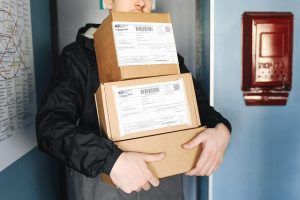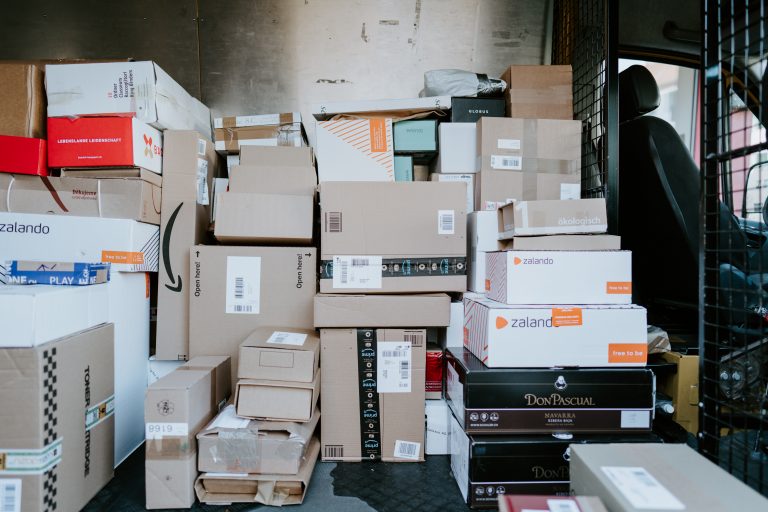By Michael Giusti, senior writer and analyst with InsuranceQuotes.com
It is a business owner’s worst nightmare — you made the sale, packed and shipped the item, followed it on the tracking site, only to have a customer call to say they never received their order.
Chances are, that package was hit by a porch pirate.
Porch pirates prey on unattended packages left by delivery drivers on doorsteps. And according to the 2021 Porch Pirate annual survey by InsuranceQuotes.com and SSRS Omnibus, porch piracy is on the rise.
According to this year’s results, two thirds more Americans say they have had a delivered package stolen from their porch or doorstep than had last year. That is a full 30% of respondents, up from 18% last year.
And more than twice as many respondents (15%) say they have had a delivered package stolen from their porch or doorstep since the beginning of the COVID-19 pandemic, meaning many of those packages were being stolen during lockdowns, with residents most likely to be home when they were originally delivered.
Pirate Peril
With a combination of supply chain struggles and COVID-19 worries, all signs are pointing to a heavy e-commerce holiday. And that showed up in the survey, with 40% of respondents saying all or most of their holiday shopping will be done online this year.
All those deliveries will come with some added stress for the shoppers, because 41% of respondents say that unattended packages give them anxiety they could be stolen.
Even though a pilfered package is technically not the retailer’s fault, that doesn’t mean it doesn’t often become their problem. First, nearly all the advice on porch piracy tells consumers to contact the retailer when their package goes missing.
The somewhat good news here is that the retailer is off the hook if the shipping company shows that the item was successfully delivered — that is, left in a mailbox or on the shopper’s property.
But on the other hand, legal liability aside, explaining to a customer that you aren’t going to reimburse them for the failed delivery can spark some heated conversations at the least, and in a worst-case scenario, refusing to refund a stolen package could even land a retailer in a dreaded Twitter flame thread — talk about PR nightmare.
Conversely, replacing the pirated package has the potential of scoring some serious good will, and hopefully a repeat customer.
Widespread risk
One of the concerning and perhaps surprising results from the survey was that it isn’t just televisions and grabbable-sized boxes that are at risk of piracy.
Seemingly everything is in play.
For instance, according to this year’s survey, 10% of respondents say they have had a delivered grocery or meal stolen from their porch or doorstep. If a pirate is willing to take groceries off a patio, that means nearly everything is at risk.
All that theft is leaving a bad taste in consumers’ mouths.
According to our survey, 72% of respondents believe that those convicted of stealing packages from porches should serve jail time. While many states are making it easier to send porch pirates behind bars, those new deterrents aren’t yet showing up in the statistical data.
Piracy countermeasures
Most of the advice on how to avoid piracy comes down to best practices on the consumers’ end — schedule delivery when they will be home, use tracking apps to monitor when the delivery is imminent, invest in an armored porch drop box. Even small countermeasures, like having a potted plant or piece of furniture on the porch that the driver can use as cover for the package is a help.
But some of the best practices can be encouraged on the retailer’s end of the transaction.
First, if the purchase is for a high-dollar item, consider encouraging the consumer buy insurance. That way if the box grows a pair of legs, you aren’t the one left holding the bill.
It can also be a good idea to suggest language on your e-commerce portal encouraging shoppers to take advantage of alternate drop-off locations. One of the more creative alternate drop off sites is the local police department in some cities — though few are regularly advertising that as a service.
More common, and nationally available, is the many shippers who partner with retail locations, such as drug stores, that act as a shipping clerk, only releasing packages to people who can show proper ID. Encouraging the use of those services may be an option for deterring porch piracy.
It might even make sense from a corporate strategy standpoint if you have a brick-and-mortar location to approach some of those shippers to have your retail location used as an alternate delivery point – that way you are getting foot traffic even if someone else got the original sale.
About the author
 Michael Giusti is senior writer and analyst with InsuranceQuotes.com. He has worked as a journalist for more than 20 years, including as a reporter at a daily newspaper in Florida, as an editor at a regional business journal, and as a writer for national and international publications. He specializes in business, technology, finance, insurance, automotive and industry-focused writing.
Michael Giusti is senior writer and analyst with InsuranceQuotes.com. He has worked as a journalist for more than 20 years, including as a reporter at a daily newspaper in Florida, as an editor at a regional business journal, and as a writer for national and international publications. He specializes in business, technology, finance, insurance, automotive and industry-focused writing.
Related Articles

How to Manage Your Amazon Seller Account Effectively in 2026?
Learn key strategies for managing your Amazon seller account in 2026, including listing optimization, account health management, inventory control, and advertising.

Transaction-Level Data Is Raising the Bar for Attribution and Accountability
For retailers building or scaling retail media and broader commerce marketing programs, this shift reshapes how audiences should be built and forces a more disciplined approach to transparency and cross-channel accountability.

How Rising Consent Awareness Is Reshaping Customer Experience, Data Quality, and Campaign Performance
It also revealed that another 35% expect to deploy personalized AI recommendations in the next year, as AI moves from pilots into the heart of omnichannel journeys, search and merchandising.

5 Strategies for Scaling BOPIS Operations During Holiday Peak Season
Companies across various sectors are leveraging automation to enhance in-store experiences and improve customer satisfaction, including within BOPIS systems. It is shown to bolster productivity and decision-making, too.


 for the latest news and job opportunities in retail tech
for the latest news and job opportunities in retail tech 